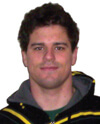We asked Mary and David Reece, two educational counselors with whom we’ve worked for several years, to update us on some of our mutual clients. Each of the three profiles below serves to illustrate some of the challenges faced by high school students, as well as how aptitude testing made a positive difference, both then and now. Nate, Chelsey, and Anthony graciously consented to letting Mary and David tell their stories.
Nate Neroni

Nate Neroni was referred to us in his junior year. Like some teenage boys, athletics—in this case, hockey—took precedence over academics. He was a classic “underachiever.” We earned Nate’s trust through working with him on the ice, and came to understand that he was not going to do anything until he was ready. He didn’t see much point in taking courses that he wasn’t interested in; hence his difficulties with the traditional high school curriculum. His parents’ concern was, “If only he would work as hard in the classroom as he does on the ice.”
The test results were a turning point for Nate. He was finally motivated and “…it gave me a sense of confidence in my endeavors.” Although his high school transcript was less than stellar, Nate applied himself after graduation and attended community college, achieving straight As in all of his courses, including economics, statistics, and accounting. He is now attending the University of Southern California, majoring in economics with a social sciences concentration and a minor in business management. “I am having the greatest success in my business-related courses, and have actually chosen professors that teach to my strengths.” MaryGail and Richard Neroni commented that, “Prior to understanding the real benefits of the Johnson O’Connor Research Foundation’s aptitude tests, $600 [currently $750] seemed like a lot; however, the return on our investment has been enormous.” Much to his parents’ delight, Nate’s priorities have shifted to a more academic focus, but he is still on the ice playing for USC’s competitive club hockey team.Nate needed some insight into his future to provide him with the motivation to persevere through courses he did not like. “Although I had some idea about what career I might like, I needed to be pointed in the right direction by something more than just my hunch.” Nate was very willing to go through the aptitude testing, saying “I knew the reasons for taking the tests and what was to be gained; it made a lot of sense to me.” Upon completion of his testing he commented, “I was surprised about the types of individual activities, and how telling they were of my strengths and weaknesses. It was fascinating that an ordinary exercise could relate so unmistakably to my aptitude for a particular career.”
A Few of Nate’s Scores: Nate’s test results revealed that economics, management, and the social sciences were all appropriate paths to consider. He has numerical aptitudes, and his objective score on the Word Association test suggests working in a collaborative way, which is typical of managers.
Another high score for Nate was on the Rhythm Memory test. This seems to be important for rhythmic activities such as dancing and drumming—and perhaps contributes to his success in sports. So, although Nate never considered himself musical, he actually is using a musical aptitude, albeit in a less obvious way.
Nate also scored high on the vocabulary tests, both math and English. One characteristic of top managers, according to a Foundation study, is a large vocabulary. While not an aptitude, Nate’s ability to communicate with others will be an asset, regardless of what his career or job might be.
Chelsey Hoh

Chelsey Hoh came to us in the spring of her junior year. Like Nate, she was an average student but an accomplished three-sport athlete, participating in cross-country, ice hockey, and lacrosse. She knew that she wanted to go to college and was very motivated to that end, but worried that she had too many choices about what to pursue. “My high school experience did not provide me with definitive insight into my strengths and weaknesses as they relate to career choices.”
Chelsey is pursuing her B.S. in Human Kinetics at St. Francis Xavier University. She is strongly considering a career in physiotherapy or a related field. She reports, “I am having the greatest success in courses specific to human kinetics, especially my exercise physiology course.”Chelsey had lots of ideas and interests, but was reluctant to make a decision because she felt she lacked important information about herself. She needed to feel that she had sound reasons, not just inclinations, to attend a particular college and study something that would ultimately provide her with a successful and satisfying career. “The…aptitude tests made so much sense to me, and I was really excited about gaining the information that I needed to make an informed decision. I thought about the test results when choosing my major because they helped me determine how successful I might be in the associated career and the related courses.”
A few of Chelsey’s scores: One of Chelsey’s key aptitudes is structural visualization (being able to think in three dimensions, or spatial thinking). Many medical and health fields provide an outlet for this aptitude, especially those dealing with anatomy and physiology—like human kinetics and physiotherapy. This kind of major also relates to Chelsey’s interests in sports and physical activities. Interests, while not as stable as aptitudes, do play a part in how people decide what to do.
Another high score for Chelsey is in foresight, an aptitude for generating possibilities. Sometimes, though, there can be too many to consider, making it harder to choose the “right” possibilities. This aptitude perhaps contributed to Chelsey’s feeling of anxiety about having too many options to investigate. We suggested she give a little thought to some long-term professional and personal goals. Goals, aptitudes, interests, and other criteria helped her narrow down all these possibilities so that she could start making some choices.
Chelsey also has art and design aptitudes that she was previously unaware of, having focused her energies on sports, not art. “There was not just one test that meant the most to me because it was when they were all put together that I learned the most about myself; however, the color sorting test was the most fun!” This is a good example of what an aptitude is—Chelsey wasn’t using this ability, yet, there it is! We talked about trying some art or design courses while at school. “Thanks to the aptitude tests, I am able to pursue something that I will be not only passionate about, but also successful in. It was really interesting to find out what my strengths were, and how well they fit with what I was considering as a major. The results helped me make an extremely important decision, and eliminated the anxiety created by the unknown. It was my ‘crystal ball’ of sorts.”
Anthony Ciardelli

Anthony Ciardelli was a very quiet, unassuming young man during his high school years. He came to us as a senior facing those all-important college decisions, “Where will I go?” and “What will I do when I get there?” We knew that he had some untapped, unidentified potential and needed a road map for his future. Anthony was a varsity hockey and baseball player who also liked film and writing. Like Chelsey, he didn’t pursue those interests in high school, though, because of his focus on sports.Anthony is studying film at Occidental College in Los Angeles, and plays on Occidental’s baseball team. “My fears of attending school so far from home were alleviated by the validation that aptitude testing provided me. The results…encouraged me to go to school in California and pursue some of my musical and filmmaking goals rather than the traditional pursuits of Eastern colleges like most of my friends. As Dave Reece always says, it’s important to be on the right road going in the right direction.”We felt he needed a postgraduate year at a competitive boarding school for growth and development as well as aptitude testing to identify his strengths. The testing ultimately provided him with the foundation for his current motivation and success. “The best part of the testing for me was the breakdown—how fascinating to have someone who doesn’t really know me, tell me all about myself.”
A Few of Anthony’s Scores: Anthony’s significant aptitudes include ideaphoria (the ability to produce ideas rapidly), musical abilities, and analytical reasoning (the ability to organize information easily). While not the only career that fits this pattern, film is an excellent choice—it is very creative, so is an outlet for all of Anthony’s ideas. In addition, music and sound are integral to filmmaking, and the ability to organize is a common aptitude of editors.
Another key piece of information was his subjective score on the Word Association test, indicating that he would prefer a more individual and specialized approach to his work, as opposed to the objective person who prefers working in a team-oriented way. Subjective people think just a little differently from others, and that can produce its own challenges. “The most helpful piece of information was learning that I have a subjective personality…now that I understand this about myself, I use it to my advantage when working with others.
“I would highly recommend everyone to take the aptitude tests. The validation and confirmation I received about myself, which I did not get during my high school experience, was extremely motivational for me to work harder and extremely helpful for me to make important decisions.”
















